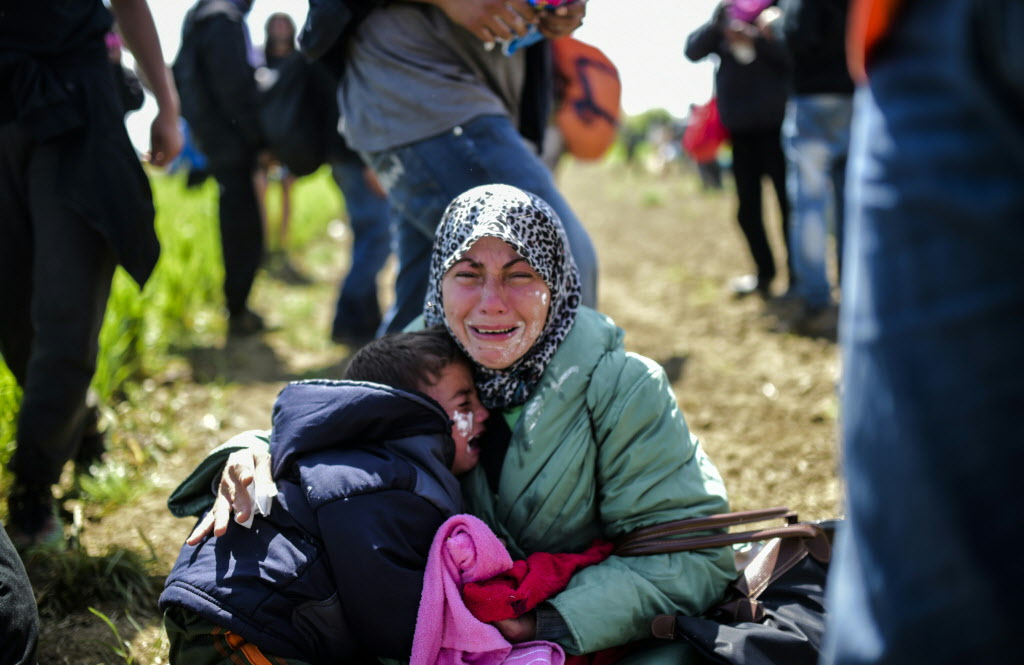On the list of urgent needs for refugees in Europe, food and shelter usually come first. But what always seems to fall to the bottom of the priority list is information. It’s less tangible than a hot meal or a tent, but it is no less critical. And right now, especially in Greece, it is in very short supply.
When I first visited a refugee camp on the island of Lesbos last summer, I was approached by scores of anxious people asking me the simplest questions: What country am I in? Is this the camp for Afghans? Can I take the ferry to Athens, or can I go to Kavala? When will the police come with registration papers? Am I free to go?
I wasn’t an expert, but there was no one else around to answer. The next day, I came back with 500 copies of an information packet in Arabic and Farsi, plus maps and a Greek-Arabic phrase list. I saw the relief on people’s faces as they read the material, how they squared their shoulders and discussed their next moves.
The situation improved in the months that followed. Various volunteers and aid organizations established concise websites, recorded audio messages for people arriving on boats, and hung maps and signs at the camps. The scuffles between frustrated refugees and police abated. People don't fight when they’re busy reading about asylum and relocation procedures.
For a couple of fleeting months, the system was working reasonably well. But now we’re back at a point dangerously close to last summer’s chaos and stress, thanks to the March agreement between the European Union and Turkey. Under that alarmingly imprecise deal, all people arriving on the Greek islands are considered — well, what, exactly? No one, including the Greek police who began deporting refugees April 4, appears to understand who should be deported and when. The police now admit they might have accidentally deported 13 people who should have been allowed to apply for asylum.
Meanwhile, the tension among refugees is mounting again. Those who have arrived in the past few weeks are confined in detention centers that are growing more crowded each day. The deal was meant to deter people from taking boats to Greece, but the smuggling traffic has not stopped — probably because there is equally little information available in Turkey. On Lesbos and Chios, there have been hunger strikes, fistfights, vocal protests and attempted suicides.
On the Greek mainland, refugees who arrived before the new agreement are not subject to the same murky new policy. But they also lack information, and they are no less confused and angry. Three weeks ago at Idomeni, a sprawling unofficial camp on the closed border with Macedonia, two men tried to set themselves on fire in protest; fortunately, they lived. Then in a port near Athens, eight people were injured in a three-hour fight. On Sunday, Macedonian police fired rubber bullets and tear gas at 500 refugees in Idomeni who had surged toward the border after a rumor circulated that it would reopen.
POLICING THE USA: A look at race, justice, media
Clear, rational legal advice and assistance could have prevented these incidents, but the more than 50,000 refugees stuck in Greece aren’t getting it. Asylum case workers are available by Skype only a couple of hours per week. Volunteers are distributing leaflets of what facts they can find and accompanying refugee friends to government offices, only to find them closed. It’s frustrating to not be able to answer basic questions: Where is this bus taking me? How long do I have to stay here? What are my options?
Moreover, anyone who has been involved in the situation at ground level has another kind of information: the personal stories of every refugee we’ve met. A few slivers make it into news reports —usually about the harrowing boat crossing, or how much they paid the smugglers. But it’s a completely different thing to learn those facts in person, as they are shared alongside more mundane details: what their houses looked like before the war; what songs they have on their phones; what cars they like to drive; what they studied in school or would like to study, if given the chance.
This exposes a simple truth that has been ignored in all the deal-making: Each refugee has a whole life story, a unique set of concerns, as valid as any other refugee’s, as valid as mine or yours. If the EU-Turkey deal is to be considered humane, if it is to be any kind of solution at all, those implementing it must prioritize good, reliable information. Refugees want to feed themselves and their children, and sleep somewhere safe. They also want — and deserve — the information necessary to build a new, secure life.
Travel journalist Zora O’Neill has worked in refugee camps on Lesbos and helps organize volunteer response in Greece. She is the author of the forthcoming memoir All Strangers Are Kin, an account of her solo travels through four Middle Eastern countries. Follow her on Twitter: @zora.
In addition to its own editorials, USA TODAY publishes diverse opinions from outside writers, including our Board of Contributors. To read more columns like this, go to the Opinion front page and follow us on Twitter @USATOpinion.


